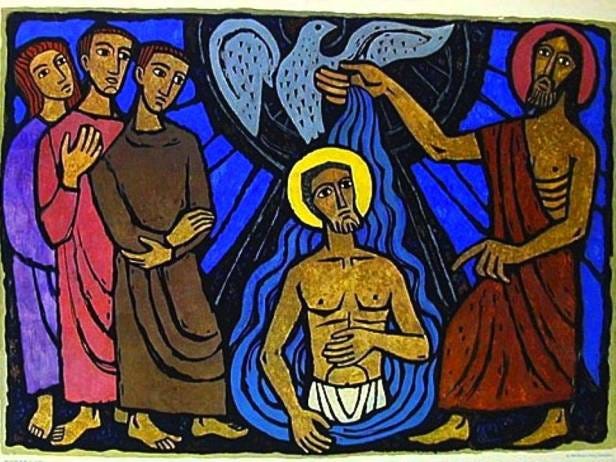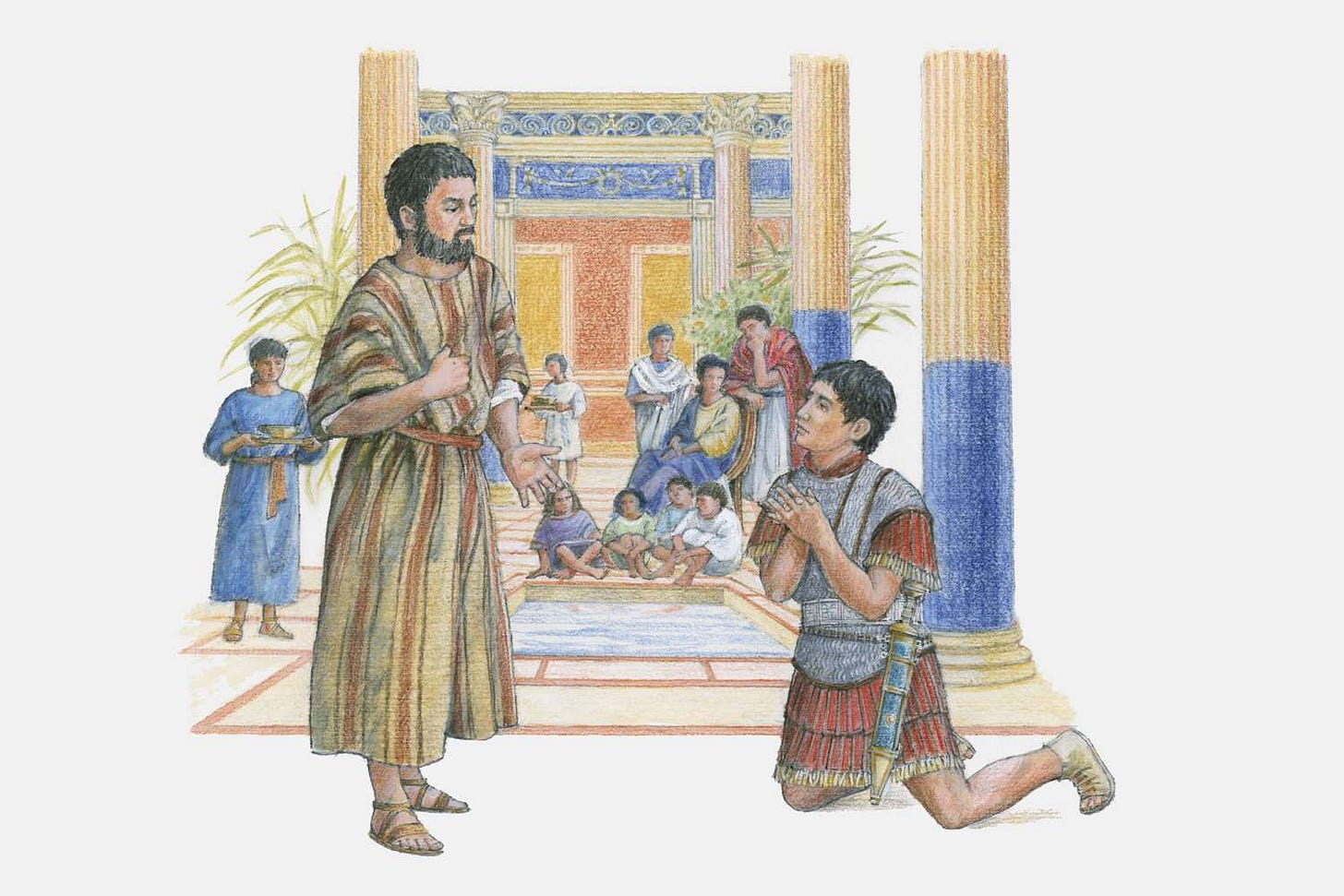Scandal
No, Not the Shondaland Show. This is about Baptism.
Dear Friends,
Blessed Epiphanytide! And a joyous celebration of the Baptism of Our Lord to come this Sunday!
A few months ago, I arrived to my classroom prepared to teach The Good Shepherd & World Communion and was met instead by a near-weekly request: can we do the Baptism story instead?
Sure, why not.
We worked our way through the shape of that story, spreading out the white circles that outline the Trinitarian foundations of Baptism, speaking together that central premise that we baptize people in the name of the Father and the Son and the Holy Spirit. And then one of my kids asked me this question:
Why do we do this?
Sometimes it’s easy to try to think too big about these things when the answer to why we baptize people is straightforward: because Jesus tells us to. Just as we are given direction to remember Jesus through the practice of coming to the table for Eucharist, Jesus directs his disciples to baptize new believers. And they did – and we continue to do so.
It seems like a too-pat answer for something so extraordinary, but that doesn’t mean it’s not true.
Your Regularly Scheduled Scandal
In the Episcopal Church, we don’t typically hold baptisms on any given day; instead there are four major days deemed especially suitable for baptism. These are the Easter Vigil, Pentecost, All Saints Day (or the following Sunday), and the Feast of the Baptism of our Lord. (It’s also considered particularly fitting for them to be done any time there is a Bishop’s visitation.) When I was growing up in the ELCA, though, a baptism could happen on any Sunday. And as an “early service” attendee, they would pop up as a particular surprise when they were scheduled for our service rather than the larger, later one.
Baptism can be commanded, as it is in its sacramental form. It can be scheduled, as it is for various liturgical reasons. But I think it is always a beautiful, scandalous moment of welcome and belonging and community.
Jesus startles John by asking his cousin to baptize him. In this cycle’s telling from Luke’s Gospel, John has already told those gathered about Jesus, saying “I baptize you with water; but one who is more powerful than I is coming; I am not worthy to untie the thong of his sandals.” How could he baptize his own Lord and Savior?
The concept of baptism as scandalous arises in multiple historical contexts. Some thought that John’s original baptismal practices were scandalous because he baptized people who were already Jewish. John’s baptismal practice stems from a Jewish purity practice sometimes called '“proselyte baptism,” which was used to convert a gentile through purification when they became Jewish. To baptize people who were already Jewish in this way didn’t make any sense – unless you were John, who declared that the Jewish community was misunderstanding baptism. To him, baptism was part of an evangelizing process and open to all sinners, which is to say all people.
Other notions of baptismal scandal engage Jesus’s own baptism. Jesus, after all, tells us that we must be reborn of water and the spirit to enter the kingdom of heaven – but he has already come to us from heaven. He is already both human and divine. Why does he need to be baptized? There are interpretations that can make it sound like Jesus’s baptism is a moment of revelation or transformation of his innate nature. But it seems in many ways to be like his working of miracles: not something Jesus needs to do, but something which he does for our benefit.
Side-By-Side Stories
In Godly Play we have a practice for more advanced circles – telling distinct stories side-by-side to see how they speak to each other. There are particular stories we do this with more often – side-by-side parables, for instance – or by telling an extension story and then bringing in one of its associated core stories; this past fall, another trainer offered the story of Moses and then we brought out the Ten Best Ways to see how they might fit into the landmarks of Moses’s own life.
Why am I telling you this? Well, returning to the question - why do we baptize people – I found myself bringing down the card featuring Jesus’s baptism from Faces of Easter. But if you haven’t seen the new Peter story, well, that one is a valuable container for the idea of baptismal scandal because it includes Peter’s baptism of Cornelius.
Peter baptizes Cornelius because Cornelius has clearly already been visited by a messenger of the Lord and who, alongside Peter, received the Holy Spirit. This is a transformative experience for Peter, at least as much as it is for Cornelius.
How does the scandal of Jesus’s baptism speak to the baptism of Cornelius, and vice versa? How are those who witness these moments changed?
Baptism changes us spiritually, but I think witnessing baptism, making those promises of support to others, has the potential to change us more if we let it. And, in particular, it allows us to think about how we live out those promises.
Yes, there is the baptism story, but there are stories that can come alongside baptism. What will we find there? (And check out the new Peter’s Journey story from the revised Complete Guide to Godly Play Volume 8!)
Resource Round-Up
We’ve got a nice long Epiphany this year, which means we don’t need to frantically all start working on our Lent plans! I love that for all of us.
Real Kids, Real Faith have a new Guided Meditation cohort forming around social justice issues, facilitating conversations around climate change, healthcare, housing, and other pressing topics. You can sign up for more information here. (And if you’ve done one of the RKRF cohorts before, I’d love to hear about your experiences!)
Roger Hutchison’s new book The Gift of Baptism is out today! I can’t wait to spend some time with this sweet new book. Hutchison’s picture book Sparrow’s Prayer is one of my all-time favorites.
Looking for a creative new fidget for your toolkit? I love these PushPeel boards (or similar knock offs) which offer creative opportunities in terms of design and facilitate focus and fine motor skill development through their use. They come in a variety of colors and shapes, including hearts and rainbows that you might pair with appropriate lesson themes.
Finally, I wonder, as we embark on this new year, what are you hopeful about? I’m a little bit of a planner nerd and am trying to envision some new planner arrangements that support both my faith practices (personal and professional) and my hobbies. And also, I dunno, things like cleaning my house.
What’s got you excited or dreaming? Tell us about it.
Peace,
Bird



